Blog
How to Properly Fit Shoes
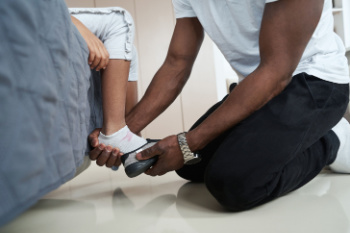
Fitting shoes correctly is essential for comfort and foot health. Shoes should fit snugly around the heel and midfoot without causing pressure or rubbing. The toe box should offer enough room for the toes to move freely without feeling cramped. While trying on shoes, it is important to ensure that the toes do not touch the end of the shoe, as this can cause discomfort and may gradually lead to foot problems. Ideally, there should be about a half-inch of space between the longest toe and the shoe’s front. The concept of breaking in shoes is real but limited. While new shoes may feel stiff at first, they should not cause persistent pain. If shoes are excessively tight, they are likely too small. It is important to try shoes on later in the day when the feet are slightly swollen to ensure they will remain comfortable throughout daily activities. If you have developed foot conditions from wearing shoes that do not fit correctly, it is suggested that you consult a podiatrist who can treat various foot ailments, and guide you on specifics for proper shoe fitting.
Finding a properly-fitting shoe is important in reducing injuries and preventing foot problems. For more information about treatment, contact Dr. Douglas Mckay from New Jersey . Our doctor will treat your foot and ankle needs.
Proper Shoe Fitting
A common concern when it comes to foot health, having properly fitted shoes can help prevent injuries to the foot. Out feet affect our posture and gait, which in turn affects the biomechanics and overall bodily structure. With 33 joints, 26 bones, and over 100 ligaments, the potential for serious injury is much greater than one realizes. Although the feet cease growth in adulthood, they still change shape as they mature. Here are some factors to consider when it comes to investing in proper fitting shoes:
- Be sure the shoes fit correctly right away
- Ensure the ball of your foot fits comfortably in the widest portion of the shoes
- Even though they may look fashionable, improper fitting shoes can either create adverse conditions or exacerbate existing ones you may already have
- Walk along a carpeted surface to ensure the shoes comfortably fit during normal activity
Keeping in mind how shoes fit the biomechanics of your body, properly-fitting shoes are vitally important. Fortunately, it is not difficult to acquire footwear that fits correctly. Be sure to wear shoes that support the overall structure of your body. Do your feet a favor and invest in several pairs of well-fitted shoes today.
If you have any questions please feel free to contact one of our offices located in Caldwell, and Galloway, NJ . We offer the newest diagnostic and treatment technologies for all your foot and ankle needs.
Causes and Treatment of Drop Foot

Drop foot, sometimes called foot drop, occurs when the muscles responsible for lifting the front part of the foot become weakened or paralyzed, making it difficult to walk without dragging the toes. Drop foot often leads to changes in gait, such as lifting the knee higher to avoid tripping. Causes of drop foot include nerve damage in the leg or spine, diabetes, or strokes. Symptoms may also involve numbness in the foot, loss of sensation, or a noticeable limp. Treatment by a podiatrist focuses on improving mobility and preventing further complications. Ankle-foot orthoses, or AFOs, can stabilize the foot and ankle, keeping the foot in a neutral position to reduce the risk of falls. Functional electrical stimulation may also be used to activate the muscles, improving walking patterns. A podiatrist can assess the underlying cause of drop foot and provide solutions to improve mobility and function. If you have symptoms of drop foot, it is suggested that you schedule an appointment with a podiatrist for a diagnosis and treatment options.
If you have any concerns about your feet, contact Dr. Douglas Mckay from New Jersey . Our doctor can provide the care you need to keep you pain-free and on your feet.
Biomechanics in Podiatry
Podiatric biomechanics is a particular sector of specialty podiatry with licensed practitioners who are trained to diagnose and treat conditions affecting the foot, ankle and lower leg. Biomechanics deals with the forces that act against the body, causing an interference with the biological structures. It focuses on the movement of the ankle, the foot and the forces that interact with them.
A History of Biomechanics
- Biomechanics dates back to the BC era in Egypt where evidence of professional foot care has been recorded.
- In 1974, biomechanics gained a higher profile from the studies of Merton Root, who claimed that by changing or controlling the forces between the ankle and the foot, corrections or conditions could be implemented to gain strength and coordination in the area.
Modern technological improvements are based on past theories and therapeutic processes that provide a better understanding of podiatric concepts for biomechanics. Computers can provide accurate information about the forces and patterns of the feet and lower legs.
Understanding biomechanics of the feet can help improve and eliminate pain, stopping further stress to the foot.
If you have any questions please feel free to contact one of our offices located in Caldwell, and Galloway, NJ . We offer the newest diagnostic and treatment technologies for all your foot and ankle needs.
Symptoms and Treatment of Bunions
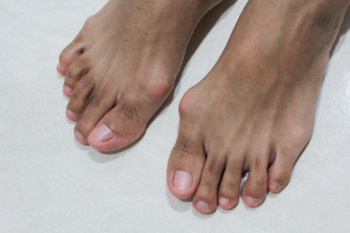
Bunions, medically referred to as hallux valgus, occur when the joint at the base of the big toe begins to protrude, often causing discomfort or difficulty in wearing shoes. A bunion develops as the tip of the big toe leans toward the other toes, leading to a wider foot structure. Symptoms of bunions include pain in the affected joint, swelling, redness, or numbness in the toes. In severe cases, bunions may limit mobility or contribute to other deformities like hammertoes. Risk factors include genetic predisposition, rheumatoid arthritis, or structural issues like flat feet. Wearing improper footwear, such as high heels or narrow shoes, can worsen the problem. A podiatrist can diagnose and manage bunions by evaluating the foot's alignment and identifying the severity of the condition. This foot doctor may recommend custom orthotics, adjustments to footwear, or, in persistent cases, surgery to correct the deformity and alleviate symptoms. If you have problems with bunions, it is suggested that you schedule an appointment with a podiatrist for a diagnosis and treatment options.
If you are suffering from bunions, contact Dr. Douglas Mckay of New Jersey . Our doctor can provide the care you need to keep you pain-free and on your feet.
What Is a Bunion?
A bunion is formed of swollen tissue or an enlargement of boney growth, usually located at the base joint of the toe that connects to the foot. The swelling occurs due to the bones in the big toe shifting inward, which impacts the other toes of the foot. This causes the area around the base of the big toe to become inflamed and painful.
Why Do Bunions Form?
Genetics – Susceptibility to bunions are often hereditary
Stress on the feet – Poorly fitted and uncomfortable footwear that places stress on feet, such as heels, can worsen existing bunions
How Are Bunions Diagnosed?
Doctors often perform two tests – blood tests and x-rays – when trying to diagnose bunions, especially in the early stages of development. Blood tests help determine if the foot pain is being caused by something else, such as arthritis, while x-rays provide a clear picture of your bone structure to your doctor.
How Are Bunions Treated?
- Refrain from wearing heels or similar shoes that cause discomfort
- Select wider shoes that can provide more comfort and reduce pain
- Anti-inflammatory and pain management drugs
- Orthotics or foot inserts
- Surgery
If you have any questions, please feel free to contact one of our offices located in Caldwell, and Galloway, NJ . We offer the newest diagnostic and treatment technologies for all your foot care needs.
Gout Pain Can Be Managed
The Importance of Treating Gout
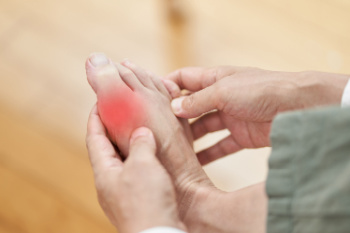
Gout is a type of arthritis that causes sudden, intense pain, swelling, and redness, often in the big toe. The pain usually starts abruptly and can be severe, making it difficult to walk or even touch the affected area. This condition occurs when uric acid builds up in the blood, forming crystals that deposit in the joints and leading to inflammation and pain. Common causes of gout include consuming too much alcohol, red meat, or sugary foods, which can increase uric acid levels. Genetics, obesity, and certain medications can also contribute to the condition. Treatment for gout typically involves medications like NSAIDs to reduce pain and inflammation, along with lifestyle changes, such as avoiding purine-rich foods. In some cases, a podiatrist may recommend prescription medications to lower uric acid levels. Left untreated, gout can lead to joint damage and more frequent flare-ups. If you have gout attacks, it is suggested that you schedule an appointment with a podiatrist.
Gout is a painful condition that can be treated. If you are seeking treatment, contact Dr. Douglas Mckay from New Jersey . Our doctor will treat your foot and ankle needs.
What Is Gout?
Gout is a form of arthritis that is characterized by sudden, severe attacks of pain, redness, and tenderness in the joints. The condition usually affects the joint at the base of the big toe. A gout attack can occur at any random time, such as the middle of the night while you are asleep.
Symptoms
- Intense Joint Pain - Usually around the large joint of your big toe, and it most severe within the first four to twelve hours
- Lingering Discomfort - Joint discomfort may last from a few days to a few weeks
- Inflammation and Redness -Affected joints may become swollen, tender, warm and red
- Limited Range of Motion - May experience a decrease in joint mobility
Risk Factors
- Genetics - If family members have gout, you’re more likely to have it
- Medications - Diuretic medications can raise uric acid levels
- Gender/Age - Gout is more common in men until the age of 60. It is believed that estrogen protects women until that point
- Diet - Eating red meat and shellfish increases your risk
- Alcohol - Having more than two alcoholic drinks per day increases your risk
- Obesity - Obese people are at a higher risk for gout
Prior to visiting your podiatrist to receive treatment for gout, there are a few things you should do beforehand. If you have gout you should write down your symptoms--including when they started and how often you experience them, important medical information you may have, and any questions you may have. Writing down these three things will help your podiatrist in assessing your specific situation so that he or she may provide the best route of treatment for you.
If you have any questions, please feel free to contact one of our offices located in Caldwell, and Galloway, NJ . We offer the newest diagnostic and treatment technologies for all your foot care needs.
When Treatment Is Necessary for Flat Feet
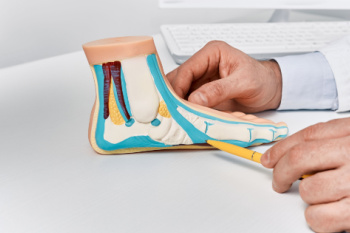
Flat feet, or fallen arches, occur when the arches of the feet flatten causing the entire sole to make contact with the ground. While some people experience no symptoms, others may suffer from foot pain, swelling, or discomfort, especially after standing or walking for long periods. Flat feet can be congenital, develop over time due to aging, injury, or arthritis, or may result from weakened tendons. Treatment becomes necessary if flat feet cause persistent pain, affect mobility, or lead to other complications like knee or back issues. Non-surgical options include wearing supportive footwear, custom orthotics, and targeted stretching exercises. In severe cases, surgical intervention may be required to correct structural damage. If flat feet are interfering with your daily life, it is suggested that you visit a podiatrist for a proper assessment and personalized treatment plan.
Flatfoot is a condition many people suffer from. If you have flat feet, contact Dr. Douglas Mckay from New Jersey . Our doctor will treat your foot and ankle needs.
What Are Flat Feet?
Flatfoot is a condition in which the arch of the foot is depressed and the sole of the foot is almost completely in contact with the ground. About 20-30% of the population generally has flat feet because their arches never formed during growth.
Conditions & Problems:
Having flat feet makes it difficult to run or walk because of the stress placed on the ankles.
Alignment – The general alignment of your legs can be disrupted, because the ankles move inward which can cause major discomfort.
Knees – If you have complications with your knees, flat feet can be a contributor to arthritis in that area.
Symptoms
- Pain around the heel or arch area
- Trouble standing on the tip toe
- Swelling around the inside of the ankle
- Flat look to one or both feet
- Having your shoes feel uneven when worn
Treatment
If you are experiencing pain and stress on the foot you may weaken the posterior tibial tendon, which runs around the inside of the ankle.
If you have any questions please feel free to contact one of our offices located in Caldwell, and Galloway, NJ . We offer the newest diagnostic and treatment technologies for all your foot and ankle needs.
How Obesity Affects the Feet
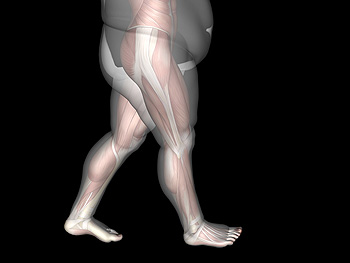
Obesity can impact the foot and ankle due to the added weight and increased pressure. The excess weight can lead to joint strain and increased wear on the bones, particularly in the feet and ankles. Over time, this added stress can contribute to the development of arthritis, causing pain, swelling, and limited mobility. Musculoskeletal problems, such as tendonitis or plantar fasciitis, are also more common in individuals who are obese due to the constant pressure on the foot structures. Walking up a flight of stairs or on an incline can further worsen this pressure, increasing ankle stress by four to six times compared to walking on level ground. This added strain can accelerate joint deterioration and lead to more severe foot and ankle conditions, making it vital for individuals with obesity to manage their weight and seek proper care for their feet. If you are overweight and have foot or ankle pain, it is suggested that you consult a podiatrist for treatment.
The more you weigh, the harder your feet must work to support your body. If you’re an obese individual and are concerned about your feet, contact Dr. Douglas Mckay from New Jersey . Our doctor can provide the care you need to keep you pain-free and on your feet.
Obesity and Your Feet
People who are overweight are putting more pressure on their ankles, knees, and hips as well as their feet. This unfortunately can lead to variety of different issues.
Problems & Complications Stemming from Obesity
- When the body is overweight, it tries to compensate by changing the way that it moves. An obese person may lean forward and put extra weight on the wrong part of the foot. This puts unnecessary stress on the feet.
- Obese people are also more likely to develop type II diabetes which is a condition that causes a lot of foot problems. People with diabetes often don’t feel the cuts and sores that they may have on their feet, which can lead to more complicated and severe issues.
- Plantar fasciitis is another foot condition that can be caused by obesity. Plantar fasciitis is an inflammation of the tissue along the bottom of the foot, which causes pain and stiffness while walking and climbing stairs.
If you have any questions, please feel free to contact one of our offices located in Caldwell, and Galloway, NJ . We offer the newest diagnostic and treatment technologies for all your foot care needs.
What to Expect After Ankle Surgery

Recovering from ankle surgery requires patience and proper care to ensure the best outcome. After the procedure, it is important to follow your podiatrist’s instructions closely to prevent complications and promote healing. In the first few days, rest is vital, and the foot should be elevated to reduce swelling. Ice can also help manage swelling and pain. Depending on the surgery, a cast or boot may be prescribed to immobilize the ankle and support the healing process. Specific stretches and exercises are often recommended once the initial healing phase is over, helping to restore strength, flexibility, and mobility. Full recovery can take several months to a year, depending on the severity of the injury and intricacy of the surgery. Throughout the recovery process, avoiding weight-bearing activities and carefully performing rehabilitation exercises are key to ensuring the ankle heals properly and that normal function is restored. If you have ankle pain, it is suggested that you consult a podiatrist who can discuss whether ankle surgery is right for you.
Foot surgery is sometimes necessary to treat a foot ailment. To learn more, contact Dr. Douglas Mckay of New Jersey . Our doctor will assist you with all of your foot and ankle needs.
When Is Surgery Necessary?
Foot and ankle surgery is generally reserved for cases in which less invasive, conservative procedures have failed to alleviate the problem. Some of the cases in which surgery may be necessary include:
- Removing foot deformities like bunions and bone spurs
- Severe arthritis that has caused bone issues
- Cosmetic reconstruction
What Types of Surgery Are There?
The type of surgery you receive will depend on the nature of the problem you have. Some of the possible surgeries include:
- Bunionectomy for painful bunions
- Surgical fusion for realignment of bones
- Neuropathy decompression surgery to treat nerve damage
Benefits of Surgery
Although surgery is usually a last resort, it can provide more complete pain relief compared to non-surgical methods and may allow you to finally resume full activity.
Surgical techniques have also become increasingly sophisticated. Techniques like endoscopic surgery allow for smaller incisions and faster recovery times.
If you have any questions please feel free to contact one of our offices located in Caldwell, and Galloway, NJ . We offer the newest diagnostic and treatment technologies for all your foot and ankle needs.
Various Types of Toenail Fungus
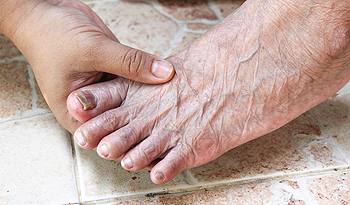
Toenail fungus, or onychomycosis, is a common condition caused by fungal infections affecting the nail. Different types include distal subungual, white superficial, and proximal subungual onychomycosis. Distal subungual onychomycosis is the most common, causing thickened, yellow nails that separate from the nail bed. White superficial onychomycosis appears as white, chalky spots on the nail surface, which can become brittle. Proximal subungual onychomycosis is rarer, starting at the nail base and spreading outward, often linked to weakened immune systems. Risk factors include warm, moist environments, trauma to the nail, and conditions like diabetes. Left untreated, fungal infections can cause discomfort and damage. If you suspect some type of foot fungus, it is suggested that you visit a podiatrist for an accurate diagnosis and effective treatment, including advanced options for stubborn nails.
If left untreated, toenail fungus may spread to other toenails, skin, or even fingernails. If you suspect you have toenail fungus it is important to seek treatment right away. For more information about treatment, contact Dr. Douglas Mckay of New Jersey . Our doctor can provide the care you need to keep you pain-free and on your feet.
Symptoms
- Warped or oddly shaped nails
- Yellowish nails
- Loose/separated nail
- Buildup of bits and pieces of nail fragments under the nail
- Brittle, broken, thickened nail
Treatment
If self-care strategies and over-the-counter medications does not help your fungus, your podiatrist may give you a prescription drug instead. Even if you find relief from your toenail fungus symptoms, you may experience a repeat infection in the future.
Prevention
In order to prevent getting toenail fungus in the future, you should always make sure to wash your feet with soap and water. After washing, it is important to dry your feet thoroughly especially in between the toes. When trimming your toenails, be sure to trim straight across instead of in a rounded shape. It is crucial not to cover up discolored nails with nail polish because that will prevent your nail from being able to “breathe”.
In some cases, surgical procedure may be needed to remove the toenail fungus. Consult with your podiatrist about the best treatment options for your case of toenail fungus.
If you have any questions, please feel free to contact one of our offices located in Caldwell, and Galloway, NJ . We offer the newest diagnostic and treatment technologies for all your foot care needs.
Are Bunions Affecting Your Everyday Life?
More...
Marathon Running and Stress Fractures

Stress fractures are a common injury among first-time marathoners, often caused by the repetitive impact of running long distances. These small cracks in the bones, typically found in the feet or lower legs, occur when the body is not given enough time to recover between runs. First-time marathoners are particularly susceptible due to a sudden increase in training intensity or from wearing inadequate footwear. Repetitive striking of the ground with each step, combined with poor running form or weak muscles, can lead to these microfractures. The primary cause of stress fractures is overuse, but factors like improper shoes, running on hard surfaces, or inadequate nutrition can contribute. Symptoms include localized pain, swelling, and tenderness that worsens with activity. Early intervention is key to preventing further injury. A podiatrist can diagnose the fractures, provide a treatment plan, and offer advice on proper footwear, running techniques, and rehabilitation exercises to prevent future issues. If you are a first-time marathoner experiencing pain, it is suggested that you schedule an appointment with a podiatrist.
Activities where too much pressure is put on the feet can cause stress fractures. To learn more, contact Dr. Douglas Mckay from New Jersey . Our doctor can provide the care you need to keep your pain free and on your feet.
Dealing with Stress Fractures of the Foot and Ankle
Stress fractures occur in the foot and ankle when muscles in these areas weaken from too much or too little use. The feet and ankles then lose support when walking or running from the impact of the ground. Since there is no protection, the bones receive the full impact of each step. Stress on the feet can cause cracks to form in the bones, thus creating stress fractures.
What Are Stress Fractures?
Stress fractures occur frequently in individuals whose daily activities cause great impact on the feet and ankles. Stress factors are most common among:
- Runners
- People affected with Osteoporosis
- Tennis or basketball players
- Gymnasts
- High impact workouts
Symptoms
Pain from the fractures occur in the area of the fractures and can be constant or intermittent. It will often cause sharp or dull pain with swelling and tenderness. Engaging in any kind of activity which involves high impact will aggravate pain.
If you have any questions please feel free to contact one of our offices located in Caldwell, and Galloway, NJ . We offer the newest diagnostic and treatment technologies for all your foot and ankle needs.
Causes of Blisters While Hiking and How to Prevent Them
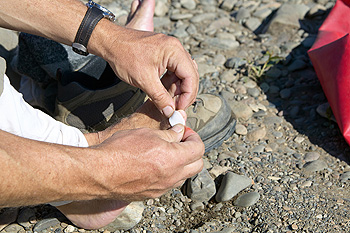
Blisters are a common issue for hikers, often caused by pressure, direct friction, and moisture. When shoes rub against the skin repeatedly during a hike, the friction creates heat, which can cause the skin layers to separate and form a blister. This is especially true if the shoes are too tight or not broken in properly. Moisture from sweat or wet conditions also plays a significant role, softening the skin and making it more prone to damage from friction. To prevent blisters, it is important to wear well-fitting shoes that provide enough room in the toe box and good arch support. Choosing moisture-wicking socks and changing them regularly can help keep feet dry. Additionally, applying blister prevention tape or lubricants to hot spots can reduce friction, keeping feet comfortable and blister-free during hikes. Foot blisters can be uncomfortable, causing patients to temporarily cease hiking. They may also become infected, needing prompt medical attention. If this applies to you, it is suggested that you contact a podiatrist who can treat foot blisters, and guide you on additional prevention techniques.
Blisters are prone to making everyday activities extremely uncomfortable. If your feet are hurting, contact Dr. Douglas Mckay of New Jersey . Our doctor can provide the care you need to keep you pain-free and on your feet.
Foot Blisters
Foot blisters develop as a result of constantly wearing tight or ill-fitting footwear. This happens due to the constant rubbing from the shoe, which can often lead to pain.
What Are Foot Blisters?
A foot blister is a small fluid-filled pocket that forms on the upper-most layer of the skin. Blisters are filled with clear fluid and can lead to blood drainage or pus if the area becomes infected.
How Do Blisters Form?
Blisters on the feet are often the result of constant friction of skin and material, usually by shoe rubbing. Walking in sandals, boots, or shoes that don’t fit properly for long periods of time can result in a blister. Having consistent foot moisture and humidity can easily lead to blister formation.
Prevention & Treatment
It is important to properly care for the affected area in order to prevent infection and ease the pain. Do not lance the blister and use a Band-Aid to provide pain relief. Also, be sure to keep your feet dry and wear proper fitting shoes. If you see blood or pus in a blister, seek assistance from a podiatrist.
If you have any questions, please feel free to contact one of our offices located in Caldwell, and Galloway, NJ . We offer the newest diagnostic and treatment technologies for all your foot care needs.
Typical Causes of Heel Pain
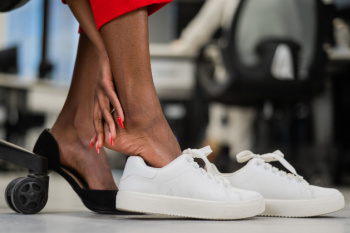
Heel pain can affect people of all ages and activity levels. It often stems from issues like plantar fasciitis, heel spurs, Achilles tendonitis, or bursitis. Plantar fasciitis, a leading cause of heel pain, occurs when the ligament supporting the foot's arch becomes inflamed due to overuse or stress. Similarly, heel spurs, which are bony growths at the bottom or back of the heel, may develop from prolonged strain on the plantar fascia. Inflammation of the Achilles tendon causes pain at the back of the heel where it connects the calf muscle to the heel bone. It is often triggered by repetitive activities or wearing poorly supportive footwear. Bursitis, or inflammation of the fluid-filled sacs that cushion the heel, can result from friction or underlying conditions like arthritis. A podiatrist can identify the root cause of heel pain by conducting a physical examination and ordering X-rays and digital imaging tests, if needed. If you are experiencing chronic or extreme heel pain, it is suggested that you schedule an appointment with a podiatrist for a diagnosis and treatment.
Many people suffer from bouts of heel pain. For more information, contact Dr. Douglas Mckay of New Jersey . Our doctor can provide the care you need to keep you pain-free and on your feet.
Causes of Heel Pain
Heel pain is often associated with plantar fasciitis. The plantar fascia is a band of tissues that extends along the bottom of the foot. A rip or tear in this ligament can cause inflammation of the tissue.
Achilles tendonitis is another cause of heel pain. Inflammation of the Achilles tendon will cause pain from fractures and muscle tearing. Lack of flexibility is also another symptom.
Heel spurs are another cause of pain. When the tissues of the plantar fascia undergo a great deal of stress, it can lead to ligament separation from the heel bone, causing heel spurs.
Why Might Heel Pain Occur?
- Wearing ill-fitting shoes
- Wearing non-supportive shoes
- Weight change
- Excessive running
Treatments
Heel pain should be treated as soon as possible for immediate results. Keeping your feet in a stress-free environment will help. If you suffer from Achilles tendonitis or plantar fasciitis, applying ice will reduce the swelling. Stretching before an exercise like running will help the muscles. Using all these tips will help make heel pain a condition of the past.
If you have any questions please contact one of our offices located in Caldwell, and Galloway, NJ . We offer the newest diagnostic and treatment technologies for all your foot and ankle needs.
Why You Should Not Ignore Foot Pain
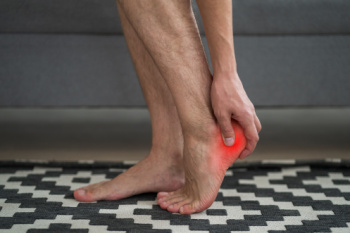
Ignoring foot pain can have serious consequences for your balance, mobility, and overall foot health. Persistent pain often signals an underlying issue that, left untreated, may worsen over time. Conditions like stress fractures, heel pain, and psoriatic arthritis are common sources of foot pain and can severely impair foot function if not addressed. Even minor discomfort can cause changes in your gait, leading to strain in other areas of the body, like the knees, hips, and back. Determining the cause of foot pain is essential for effective treatment, as each condition requires a different approach. Addressing foot pain early can help you maintain balance, improve mobility, and reduce the risk of chronic issues, keeping you active and pain-free. If you suffer from foot pain, it is suggested that you schedule an appointment with a podiatrist for a proper diagnosis and treatment.
Foot Pain
Foot pain can be extremely painful and debilitating. If you have a foot pain, consult with Dr. Douglas Mckay from New Jersey . Our doctor will assess your condition and provide you with quality foot and ankle treatment.
Causes
Foot pain is a very broad condition that could be caused by one or more ailments. The most common include:
- Bunions
- Hammertoes
- Plantar Fasciitis
- Bone Spurs
- Corns
- Tarsal Tunnel Syndrome
- Ingrown Toenails
- Arthritis (such as Gout, Rheumatoid, and Osteoarthritis)
- Flat Feet
- Injury (from stress fractures, broken toe, foot, ankle, Achilles tendon ruptures, and sprains)
- And more
Diagnosis
To figure out the cause of foot pain, podiatrists utilize several different methods. This can range from simple visual inspections and sensation tests to X-rays and MRI scans. Prior medical history, family medical history, and any recent physical traumatic events will all be taken into consideration for a proper diagnosis.
Treatment
Treatment depends upon the cause of the foot pain. Whether it is resting, staying off the foot, or having surgery; podiatrists have a number of treatment options available for foot pain.
If you have any questions, please feel free to contact one of our offices located in Caldwell, and Galloway, NJ . We offer the newest diagnostic and treatment technologies for all your foot care needs.



